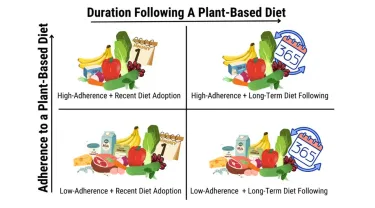A team at the Gerald J. and Dorothy R. Friedman School of Nutrition Science and Policy at Tufts University has developed the first standardized metric to compare how well individuals adhere to different popular diets. Described in a study in the journal Appetite, the Scoring Adherence to Voluntary Restriction Diets (SAVoReD) metric offers researchers a rigorous method for evaluating adherence across diverse dietary patterns in real-world settings.
Measuring dietary adherence has long posed a challenge in nutrition science. Most large studies rely on simplistic self-reports, without a clear method for verifying whether participants truly adhere to the diets they claim to follow. That shortfall makes it harder to accurately connect how diets relate to outcomes such as body mass index (BMI), cardiometabolic risk, and thus major predictors of long-term disease prevention.
SAVoReD addresses this challenge by providing a metric that can be applied to a range of popular food-group restricting diets, including vegan, whole-food plant-based (WFPB), paleo, and vegetarian, among others. The tool’s systematic approach to scoring allows researchers to accurately assess how sticking to these diets—or not—shapes health outcomes. It also gives them an opportunity to make nuanced comparisons across diet groups that might otherwise be difficult to evaluate side-by-side.
New Insights into Diet Quality and Health
Applying SAVoReD to a large U.S. sample, the researchers found that individuals who followed restrictive diets—particularly vegan and WFPB—exhibited high adherence scores, the healthiest BMI, and the highest diet quality. In addition, many were long-time diet followers, sticking to their regimens for more than two years. Participants following these diets had mean Healthy Eating Index (HEI) scores of 75.7 and 76.7, respectively. These figures substantially exceed both the U.S. population average of 59 and the scores seen among participants following less restrictive diets.
The study also showed a strong association between higher adherence and both lower BMI and higher HEI scores for fully plant-based diets (compared with diets with more animal-source foods), with the most pronounced effects among individuals maintaining their diet for more than two years.
The findings pose new evidence suggesting that some diets may confer greater advantages over time, whereas others plateau—but additional studies are needed to provide conclusive evidence, says Suzannah Gerber, lead author of the study and a U.S. Department of Agriculture-National Institute of Food and Agriculture research fellow at the Friedman School. Nevertheless, the results do suggest that even partial adherence to fully plant-based diets may offer substantial advantages for diet quality and healthy weight management.
“This underscores why it’s so important to capture adherence directly,” Gerber explains. “Without specific measures, we risk missing critical details or underestimating the real relationship of these diets to long-term health.”
Advancing Research and Informing Policy
The tool carries significant implications for research and policy. Enabling comparisons of adherence across different diet types, SAVoReD can be used to reanalyze earlier studies (which only asked about diet type without measuring adherence), to support the design of new interventions, and to refine predictive models linking diet to chronic disease risk.
Also, the tool arrives at a moment when national dietary guidelines are placing greater emphasis on increasing plant-based dietary choices. This metric can help offer public health leaders timely evidence on what success might look like for individuals following these recommendations.
“As national guidelines increasingly suggest plant-based choices, a tool like SAVoReD is essential,” says Gerber. “It can help show which diets are linked to better health and how well people actually follow those diets in everyday life and over time. We couldn’t reliably capture that before.”
SAVoReD joins a suite of influential metrics developed at Tufts—such as the Food Compass and the Mediterranean Diet Adherence Score—that are shaping the field of nutritional epidemiology. Together, these tools help researchers, clinicians, and policymakers better define aspects of healthy eating and how healthy-eating approaches can translate into real-world behavior.
